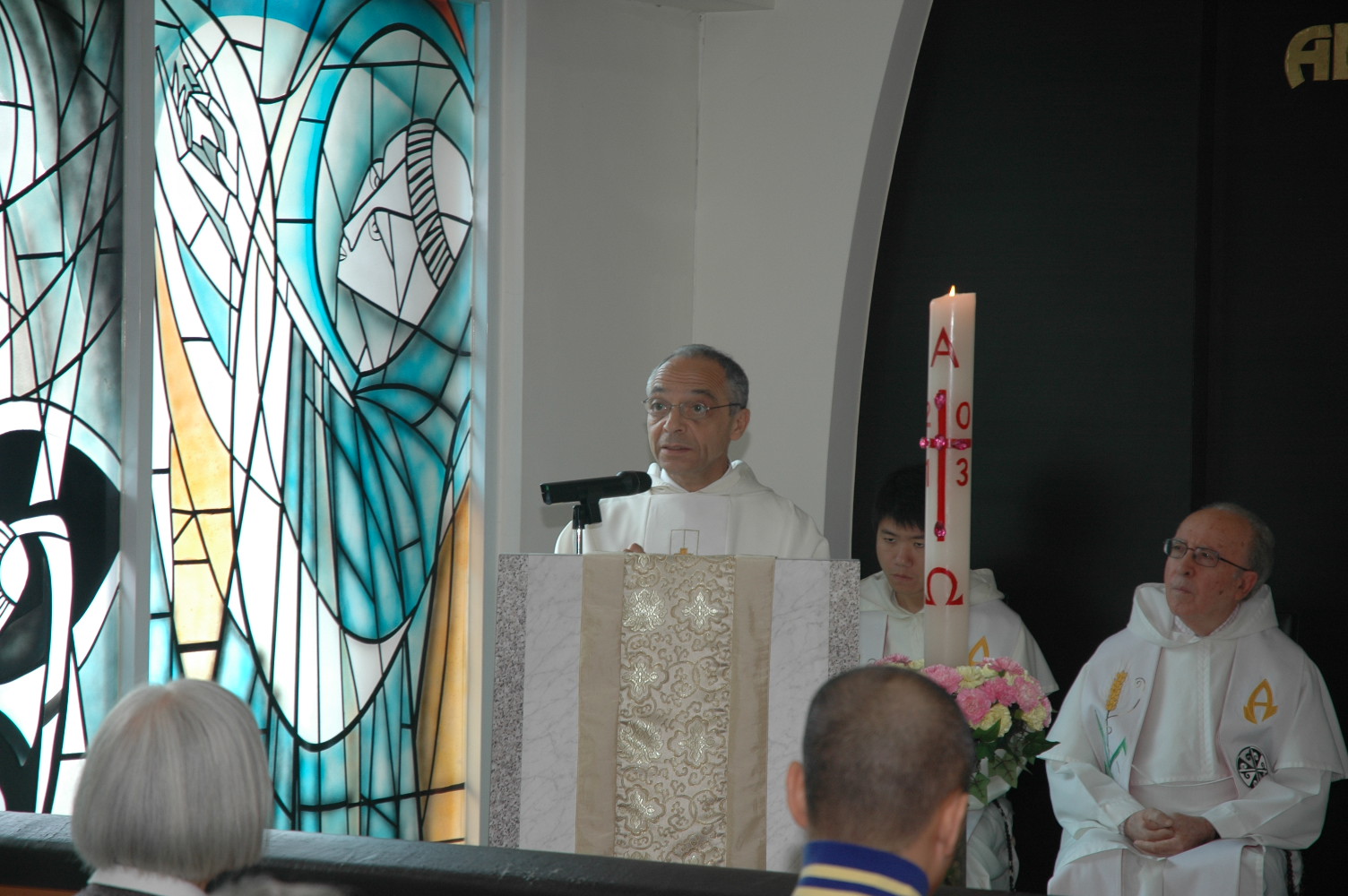
Â
(Homily of the Master of the Order in the Mass of the 6th Sunday of Easter, 2013.
See Ac 15:1-2, 22-29; Rev 21:10-14, 22-23; Jn 14:23-29)
Â
In these days after the celebration of Easter, just before the feast of the feasts (the Ascension of the Lord) we assist, in the readings of the Acts of the Apostles, at one foundational moment of the Church of Christ. Learning from this moment, as Christians, as preachers, we must not forget that our preaching is, always, to remember that we are called to found the Church of Christ by giving the Gospel to the world.
It is one foundational moment because it is the moment when the Church is built in communion. A dissension appears in Antioch, and the Church of Antioch decides to send brothers to Jerusalem so that the Apostles and the Elders help them find a good solution. These exchanges of visits between two Churches, this mutual confidence, the capacity of respect for each one, all this is factor of communion. To preach the Gospel, to announce the coming of the Reign of the Lord is to preach communion.
It is one foundational moment of the Church because starting from this common seeking of unity it is possible to affirm a conviction: It is not the circumcision which gives safety but rather the faith which directs all the believers towards the same mystery of unity. And this mystery of unity is the Word of Christ; this mystery is the Christ who is Word of the Father. To preach the Gospel is a call to open our lives to the work of the Word of the Father in the world, in each human life.
It is one foundational moment of the Church because, starting from what is called the “council of Jerusalem,†the assembly of the believers in the living Word knows that it has to reach all, beyond the known identities, beyond the borders of the usual world. The assembly of the believers discovers that it becomes the Church of Christ, the Body of Christ, when and if she opens, when and if she widens her tent to the dimensions of the world, when and if she welcomes as brothers all those who share the same faith and remain faithful to the same Word. To preach the Gospel, to announce the coming of the Reign of the Lord is to try to build, concretely, the catholicity of the Church, the universality of the assembly of Christ’s friends.
It is one foundational moment of the Church because the Church of Jerusalem recalls that one should not be lost in false criteria but rather has to refer to the essential commands, the essential necessities. And the necessities which are essential are clear: No compromising with the idols because there is only one God; no violence against life because it is the first gift of God; no illegitimate alliance because God trusts man so much that he asks him to be in this world through his human commitments, the fidelity to the covenant of friendship that he, God, wants to establish with humanity. To preach the Gospel, is to announce, and to practice, the covenant of friendship with our God and Lord.
Yes, it is one foundational moment of the Church because the Apostles and the Elders, by indicating the manner of solving the conflict in the Church of Antioch, recall what gives value to their judgment: « The Holy Spirit and ourselves »… And we then understand best the meaning of the Gospel of this day: The Holy Spirit that the Father will send in my name, will teach you everything, and will remind you all that I told you.
We are in the moments which precede the Ascension of the Lord. And Jesus tells the disciples: I am going away, and I come back. He does not say: I am going away and, later, I will come back. But he affirms that, in the same movement, he goes to the Father and comes back with him in the midst of them, and they will make their dwelling with them. The Church is established by the coming among the assembly of the believers of the mystery of unity between the Father and the Son, by the coming in the midst of them of the Fire, the Light, the Breath of the Holy Spirit. I am going and I am coming: The Son opens a new time for humanity, a time to live by the life of the mystery of the unity of the Father with the Son, the unity of the Holy Spirit. This mysterious presence makes the Church be the “memory†(it will make you remind) of the love of the Father for the world, expressed by the sending of the Son. The Church is established because, by the mystery of the work of the Holy Spirit, she is in the midst of the world as the sacrament of the covenant of God with the world, the sacrament of salvation.
FR. BRUNO CADORÉ, OP
St. Dominic’s Priory, Macau
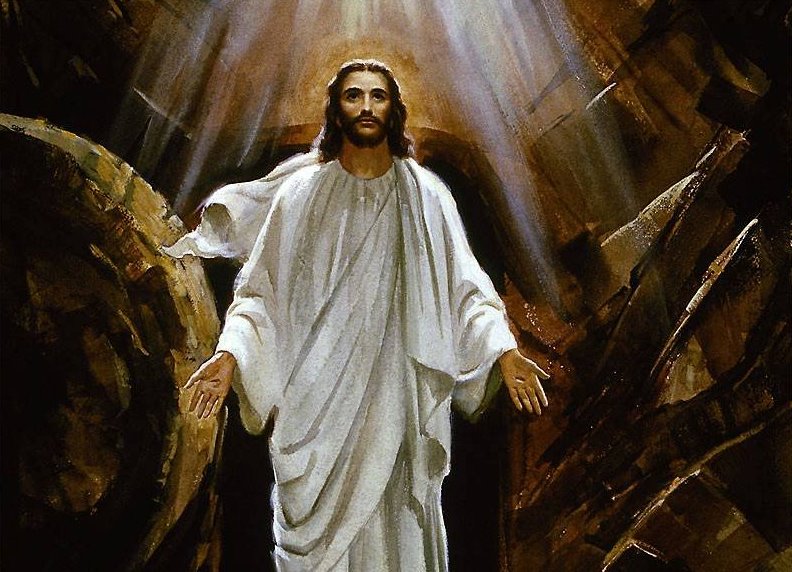
“Bending downâ€
 Christ has risen alleluia!
Dear Brothers and Sisters in Christ!
 Today is Easter Sunday. We commemorate Christ’s victory over death but also our redemption and new life in Christ. Last night Fr. Prior’s homily told us that Easter is the culmination of our Lenten observances. The end of our Lenten journey so to say. True we have ended our Lenten journey, but we can rightly call the “first leg†of our journey to the Father; for with Easter, we commence another “leg†of our journey now as the people of God saved in the faith in Jesus and as a people: sons and daughters of the light.
 Last Good Friday, while we were taking lunch at the refectory, one of the student brothers asked me why do we have to add the fifteenth station of the way of the cross, because usually we end the way of the cross with the entombment of Christ. I tried to explain to him and to convince him of this arrangement because I believe that it would be more theological to end the meditation of the passion and the death of Christ with our sights upon his glorious resurrection. His resurrection is the key to understand and comprehend all of Christ’s teachings and the mystery of his person. I do not know if I was able to convince him, though I could still foresee he would still have his querying eyes. With this dilemma, I began this reflection.
 Why must Christ die and rise again? This had been the question since the news of the death of Jesus spread among his followers. Why must he die? This was the question that haunted the disciples who had opted to leave to save themselves as Jesus underwent his arrest, trial, death and burial. Questions that brought them fear, and even horror since without Jesus their master in their midst they began to realize that they were just a mere collection of fishermen, illiterate, insignificant and forgotten portion of a society that had lost their interest on their teacher. Time and time again, Jesus reminded them of his impending fate: that he has to go to Jerusalem, face his enemies, fall in their hands, die and rise again… but the shimmer and the glitter of his popularity, the adulation of the populace made them deaf to the teachings of the master as they enjoyed basking in the shining sun of Jesus’ popularity among the people.
 In today’s Gospel, John relates to us what had happened three days after the tragic death of Jesus. It was a normal Sunday but suddenly Mary Magdalene came to convey a very strange news: the body of Jesus had been taken away… The disciples who had been hiding in the upper room were filled with consternation and horror with such news. Peter and the disciple whom Jesus loved ran out of the city to see for themselves the report made of Mary and the other women disciples: what happened here?
 John as a good story teller tells us what happened: the two disciples ran to the tomb where Jesus was laid. Perhaps the disciples whom Jesus loved—identified in tradition as John himself —ran as fast as he could to the tomb, while Peter, perhaps older and heavier, came too himself, but was a few paces behind the agile youth. They came to see for themselves the empty tomb as reported by these hysterical women. The gospel continues: the younger disciple “bent down and saw the burial cloths there, but did not go inâ€. Peter came and entered, saw the telltale signs of something strange … evidence that the story of Jesus does not end with his death, but it is just beginning….The younger disciple “saw and believedâ€; And further concludes that they did not understand the scripture that he to rise from the dead.
 A phrase that struck me in the passage “ he bent down…â€, which was the same phrase used by Luke which we had proclaimed last night when he said: “Peter got up and ran to the tomb, bent down and saw the burial cloths…â€
 “Bend downâ€â€¦. “Bent downâ€â€¦was this perhaps that one has to bend down to enter the narrow door of the tomb Joseph of Arimathea had donated for Jesus’ burial? What does it mean to bend down? Because if you will observe in both narratives… after bending down.. can they see the signs… the evidence of the resurrection…only after bending down can they see the empty tomb, the face cloth and burial cloth rolled beside… What does it mean to bend down for us in order to believe and understand?
 “Bending down†is the only attitude for us to comprehend what had happened that fateful morning, and to understand the mystery of Christ.
 “Bending down†is the attitude of faith, of recognizing our ignorance, our littleness, our vulnerability and our need for Christ.
 “Bending down†is to throw away our airs of academic success and social position, in order to enter the narrow door of the sepulcher in order to see… to see in order to believe…
 Man’s tragedy today is that believing in Christ and even a Supreme God is out of his list of priorities. Many believe that “believing†or “bending down†to a supreme being is an atrocious affront to man’s dignity and that is why the denial of God, the denial of religious experience and religion itself. For us Christians, specifically Catholics, many leave the Church since they are appalled with the scandals wrecking havoc in the Church, both real and imagined, many are scandalized with the wealth of the church, the political struggle among church men and even among laypeople for power, glory and popularity, some leave the Church because they cannot accept moral and theological teachings since it is not in their liking and demand that they have to change their lives, their values and their outlook which might be anti-Gospel. These are problems and challenges all believers and needs to be addressed and that is why the constant call to renewal, conversion and more authenticity in our lives as believers. But on the other hand, there are also many believers who leave the Church at the drop of the pin. Examining their excuses, without judging their sincerity, a good number of them leave the church due to very trivial reasons and added to this is the rising tide of religious indifference, moral relativism among younger generations. Today to be secular is cool, to be an atheist is now the toast of the town. All seem to be walls but there seem not to have any entrance to the sepulcher… and if there is an opening, it is too small and it demands us to “bend down†to see the proofs of his resurrection.
 Today, the risen Christ invites us to “bend down†once again… to believe in Him and to believe that his immense power of love has conquered death and sin. Only by bending ourselves to enter into the narrow gate of faith, the narrow gate of transparency, of nakedness can be understand why did Jesus had to die… and why Jesus had to rise from the death… and why we believe. We believe because Jesus action of love has touched us, He has touched you and me and has transformed us to be men and women not only redeemed but now empowered to love and like Him has the power to transform our weakness, our sinfulness, our selfishness, our egoism and pride because of HIS love. If we are capable of bending down to see.. then we shall also be willing and happy to bend down to wash the feet of our brothers, bend down to help those who had fallen and lost all hope, bend down to understand. Comprehend and be one to those who are beaten down on their knees and on their taunt stomachs by the weight of injustice, of poverty, of unhumanity. Bend down to see the downtrodden, the forgotten and the marginalized. Bend down to see the real face of human drama: Who we are and Who God is.
 “Bending down†allows us to see the signs… the evidences… blind faith without reason lead us to fundamentalism, pietism and emotionalism… these threaten authentic faith… bending down demands from us to see the signs.. to read the signs and to process these signs to strengthen our faith. That is why a faith that is not formed, not constantly updated and strengthened with study, celebration through liturgy and sharing in the community will only make “bending down†a mere physical action, perhaps after an aching back, it will not linger in our lives.
 John ends his narrative with this beautiful words: “he saw and believedâ€. Perhaps instead of reciting a litany of patristic texts to the brother who wanted to know why the XV station had to be included in the way of the cross, I should have asked him just to “bend down†, it would have been easier to convince him… because like the beloved disciple, I too had bend down, saw and believed…
 How about you?

Jarvis Sy Hao, O. P.
St. Dominic’s Priory, March 2013.
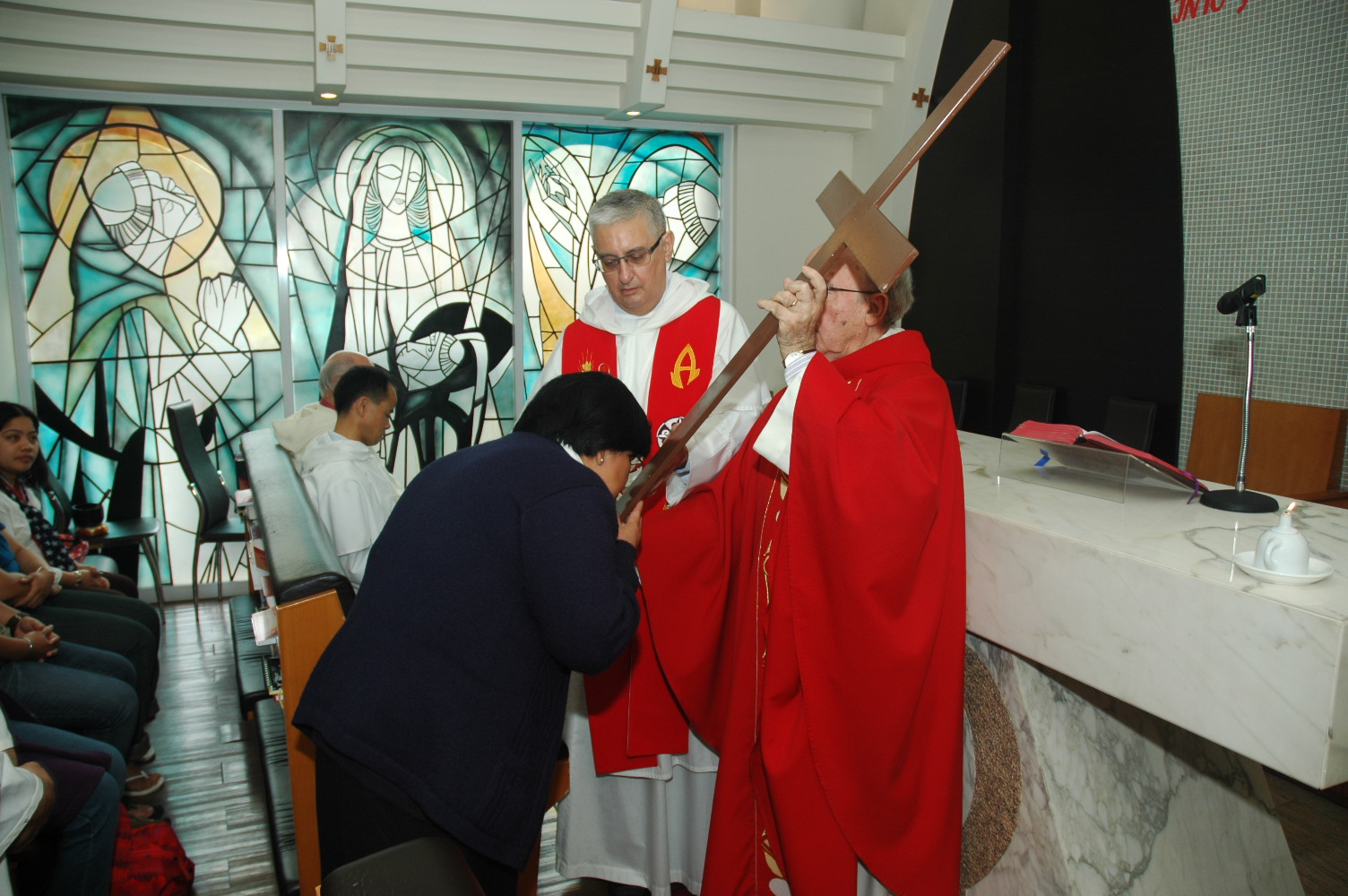
 (The best homily today, Good Friday, is a silent homily. Let the Cross speak! Forgive me, Lord, for speaking, but I feel obliged to speak of silence, of the silence I long for)
On Good Friday, we commemorate the death of our Lord Jesus Christ. We contemplate in silence the Crucified Lord. Between the death of the Crucified Lord and his resurrection we are invited to listen to the sounds of silence coming from the naked Cross.
Word and silence are two ways of speaking. We need silence not to drown in words. We need silence to speak the saving word. We need silence, to empty our hearts of selfishness and be able to listen to others, to listen to God: “I hold myself in quiet and silence, like a little child in his mother’s arms, like a little child, so I keep myself†(Ps 131:2).
Good silence is contemplative silence: the silence of creation, the silence of the cross of Jesus. It is like the silence of Mary, who kept all the things happening around Jesus in her heart (Lk 2:51): in her, “all was space for the Beloved and silence to listen†(Bruno Forte). Like the silence of Joseph who, feeling the hand of God, accepts silently the motherhood of Mary and the mysterious life of Jesus (cf. Mt 1:24). Like the silence of Jesus during his public life, a silence that underlined his words, a silence the saints learned from him. We are taught by the saints to cultivate silence in our life, to appreciate the silent love of the mystics, the pregnant silence of St. Thomas Aquinas after his mystical experience on December 6, 1273; after this, no more words, no more writings – total silence! St. John of the Cross speaks of the silent contemplation of his Beloved without the noise of voices: the tranquil night, / silent music, / sounding solitude, / the supper that refreshes and deepens love (CB 14-15). Blessed Mother Teresa of Calcutta asked her sisters to practice first the virtue of kindness and second the virtue of silence, a silence she witnessed also by smiling – to conceal her great inner sufferings.
“The Church – all of us – must discover the power of silence†(Cardinal Luis Antonio de Tagle). The liturgy speaks of a sacred silence to allow “the voice of the Holy Spirit to be heard more fully in our hearts.â€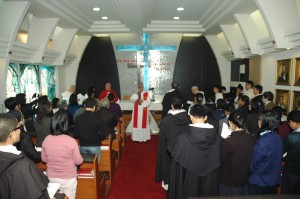
Good Friday! Jesus on the Cross is silent: his serene silence to the many questions of Herod; his calm silence to the cry of the people, “Crucify him! Crucify him!†his humble silence while he is horribly scourged at the pillar. Jesus is patiently silent through his whole passion – at times he pronounces a few words that dramatize his talking silence. Jesus, the Suffering Servant of Yahweh “never opened his mouth, like a lamb led to the slaughter-house, like a sheep dumb before the shearers, he never opened his mouth†(Is 53:7).
Jesus on the Cross faced also the silence of God. From the Cross, Jesus asked his Father: “Why have you abandoned me?†God’s answer was: silence. The silence of God, the mysterious silence of God yesterday and today in the midst of darkness, of desolation, of deadly natural calamities, of war… Why this silence, God? Where are you when we hurt terribly? Why do you allow so much evil in the world? Benedict XVI asked in his visit to the concentration camp of Auschwitz-Birkenaw: Why the Holocaust? Why, Lord, did you remain silent? How could you tolerate all this?†(May 28, 2006). I ask you, my dear God: “Why did you allow the terrible crucifixion of your Son†– of your Son? St. Dominic’s favorite book is the book of charity, that is, God’s love revealed in the cross – in the silent cross.  Dear God, “May we not forget that you also talk when you keep silent… In your silence as well as in your word, you are always the same Father, the same paternal and maternal heart, and you guide us with your love and elevate us with your silence†(S. Kierkegaard).
 “Something strange is happening—there is a great silence on earth today, a great silence and stillness†(from an Ancient Homily), the strange silence of Good Friday and Holy Saturday. It is the silence of the naked Cross, of the hopeful Cross of Christ! Our silence before the Cross of Christ is indeed the hopeful silence that is directed to Easter: from the loud silence of Jesus’ death to the sounding joy of his resurrection.
With St. Bernard we pray to the Lord: “There is in your adorable Passion, Lord, a word that moves me and speaks like no other word. It is the word you have not uttered, the word of your silence. When, Lord, when will I learn your silence, and when will I know that You, only You justify and condemn? When, my Jesus, will I learn to keep quiet, to talk little with men and much with You? When shall I imitate your silence – humble, patient, adorable silence? Oh silent Jesus, give me the holy virtue of your silence!â€
Fausto Gomez, O. P.
St. Dominic’s Priory, March 2013
 The celebration of tonight’s liturgy marks the end of Lent and the beginning of the Easter Triduum. During the Easter Triduum or the holy three days, which is the longest Liturgy of the church year, we celebrate the greatest event ever taking place in the life of any believer, the event of our salvation. It begins tonight with the washing of the feet and the establishment of the Eucharist and priesthood, continues through tomorrow, where we all will accompany Jesus all the way to the cross and concludes with the Easter Vigil, when the glory of the risen Christ will be revealed to us.
Tonight celebration is not just a dramatization, or a historical look back at events in the life Christ. It is about bringing to life, making present the mysteries we celebrate: the celebration of Eucharist, the institution of the priesthood, and the mandatum or the new commandment.
If we thumb through the pages of the Holy Scripture we will see that for the Jewish people the Passover meal was one of the biggest feasts of the year. It was a time for the people of Israel to give thanks for their salvation. To remember the night they were saved from slavery. A time to remember how the Lord went through Egypt and passed over their houses, a time to recall how the God of their fathers opened the waters of the sea to bring them to the Promised Land.
This evening, we look back at how Jesus celebrated the Passover with his disciples, bringing the Passover Meal to its ultimate purpose and meaning. It was on that table where Jesus sat with his disciples that He began to reveal the real meaning of the Passover. He showed Himself as Son of God who would be sacrificed on the first Good Friday for our sins. On that night, on the upper room and in front of his disciples, He offered Himself; He gave His Body and Blood, in the great mystery of faith as our food for eternal life. It was on that gathering on the upper room that the meaning of this celebration changed from a recall gathering to a living gathering.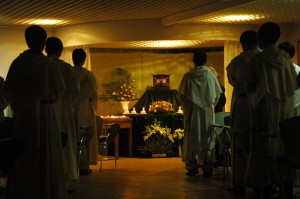
It is because of that change of essence in the meaning of the Passover meal that the Eucharist we celebrate, contrary to the Passover meal celebrated by the Jews is not just a recall of what happened in the past. We are not here just to remember, for if the love of God is not manifested through our life to the world by what we do here then it is not an authentic Eucharist. The food we receive here is not just for contemplation or adoration. It must be food for action; we have to become the new bread for the world.
It was also on that same room and at that same Supper that Jesus established, the Sacrament of Priesthood and commissioned the apostles, as the first priests of the New Covenant, with the command “Do this in memory of me.†When Saint Paul explains to Corinthians the institution of the Eucharist he says that this power is given to mere men, not because of any personal worth, but explicitly because Jesus Christ, who commanded, “Do this in memory of me†has chosen it to be so and he prayed to the Father for them “Consecrate them in the truth.†(John 17:17)
It was during this commission to service through the ministry of priesthood that Jesus washed the disciples’ feet. “Master, you will never wash my feet. Peter rebuked Jesus when He approached him and knelt in front of him. I guess Peter said this out of shock. The disciples were horrified. The washing of the feet was only done by the slaves and servants. It was a scandalous thing to do. Not only they did not understand what Jesus was doing, but they did not want to be part of it. “What I am doing, you do not understand now, but you will understand later.†Jesus answered and said to him and to the rest of the disciples. By his action Jesus symbolically overturned the whole social order. In that one significant act he showed his disciples and teaches each one of us that Christian’ greatness is not determined by position, or rights or education or title. Christian values are measured by a readiness to meet the need of the moment with an act of service and love.
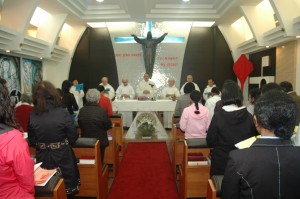 My dear brothers and sisters tonight we recall the occasion on which the institution of the Eucharist, the establishment of priesthood and the washing of the feet took place. But we are not here just to remember. The Eucharist is the culmination of Jesus’ love for us, and our celebration of the Eucharist should send you and me out from here to minister, to serve and to love the Lord in others. “I give you a new commandment: love one another. As I have loved you, so you also should love one another.†(John 13:34). This commandment is not just a remembrance of what Jesus said but, a legacy for all Christians to follow. On this Holy Thursday through these mystical actions and signs let us make a living presence the mysteries that we celebrate.
My dear brothers and sisters tonight we recall the occasion on which the institution of the Eucharist, the establishment of priesthood and the washing of the feet took place. But we are not here just to remember. The Eucharist is the culmination of Jesus’ love for us, and our celebration of the Eucharist should send you and me out from here to minister, to serve and to love the Lord in others. “I give you a new commandment: love one another. As I have loved you, so you also should love one another.†(John 13:34). This commandment is not just a remembrance of what Jesus said but, a legacy for all Christians to follow. On this Holy Thursday through these mystical actions and signs let us make a living presence the mysteries that we celebrate.
 I wish you the richest blessing of God in these Holy Days. May all of us be sustained by the Bread of eternal life as we look with hope to Easter!
Fr Alejandro Salcedo, O. P.
St. Dominic’s Priory, March 2013

|
Isaiah 50:4-7
|
Philippians 2:6-11
|
Luke 22:14 – 23:56 // Luke 23:1 – 49
|
 Today we celebrate Palm Sunday, also called Passion Sunday. It introduces us into Holy Week, during which we commemorate the chief mysteries of our faith and contemplate the words and deeds of the Lord in the last days of his earthly life. Today we celebrate the triumphant entrance of Jesus into Jerusalem to accomplish the great mystery of redemption through his Passion, Death, and Resurrection.
In simplicity of faith, let us now join the procession of the children of Jerusalem to acclaim, honor and praise Christ our King and Lord. Let us welcome him into our hearts and homes so that he may rule and govern our lives.
Jesus is the King that comes not to dominate, but to serve and to give his life as a ransom for the human race. That is why, after the joyful procession, today’s liturgy changes the liturgy of his Passion.
The Passion of Jesus is the supreme sign of love and mercy of the Father. After the drama of so much love and so much suffering, the crowd went back beating their breast. In the story of the Passion, the divinity of Jesus remains hidden; instead, the suffering servant is manifested in all his pain and misery.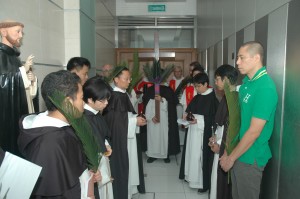
The same Jesus, who escaped from the crowd which wanted to make him king, today accepts to be honored and we join him in his triumphal entry in Jerusalem. The humiliation of Christ is contrasted with the highest honor. But how fickle this world is! Those who acclaim Christ today as King will cry for his blood within a few days!
The lowliness of Christ as the servant and his majesty as the Lord both appear in today’s liturgy. He enters the city humbly, on the back of a donkey. He is acclaimed by exalting crowds, but his earthly glory is short-lived. His Kingdom is not of this world. The red carpet treatment the people give him ultimately contributes to his condemnation.
In the suffering Christ we discern the human spirit buffeted by enemies, but still loyal to the Lord God. He chose to be humiliated one for the sake of all the lonely ones whom he has served. The depth of his abasement is the point at which Christ is fully the man of others. He became a brother and a servant of all, even to the extent of suffering and dying for them. He emptied himself: he was one like us, one with us and one of us in all things, except in sin. He died a shameful and miserable death, and this man was God. We have a God who died for us and has become a source of life for us. He lives and gives life. By his wounds we are healed.
The life and death of Christ have not only benefited our human life on earth, it has changed our very purpose in life, our relationship with God and opened the gates of heaven for us.
Millions of our brothers and sisters, through no fault of their own, have not yet heard the Good News of God’s infinite love for them; but God will find his way of extending the benefit of his love for them. There are also millions who have heard the Good News of Jesus and rejected it; God knows how to be merciful to them, too. But what about us, professed followers of Christ? During this Holy Week we should be repeatedly reminded of what God has done and is continuing to do for us. We can only beat our breast in humble contrition, for we are unworthy of the infinite love of God.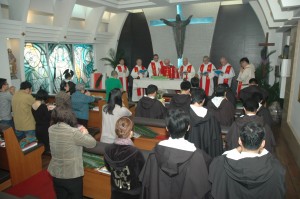
If we did not offend Jesus openly as the soldiers did on Calvary, or Pilate that condemned the innocent Christ for fear of the Jews, or Judas Iscariot that betrayed him for thirty pieces of silver; we may have done so indirectly by our indifference and negligence. Are we much better? How often have we offended him for similar motives? And we have no excuse, for we should know better than they, as to what Christ means for us.
 Fr. Dionisio Cabezón, O. P.
St. Dominic’s Priory
 Macau, March 23, 2013
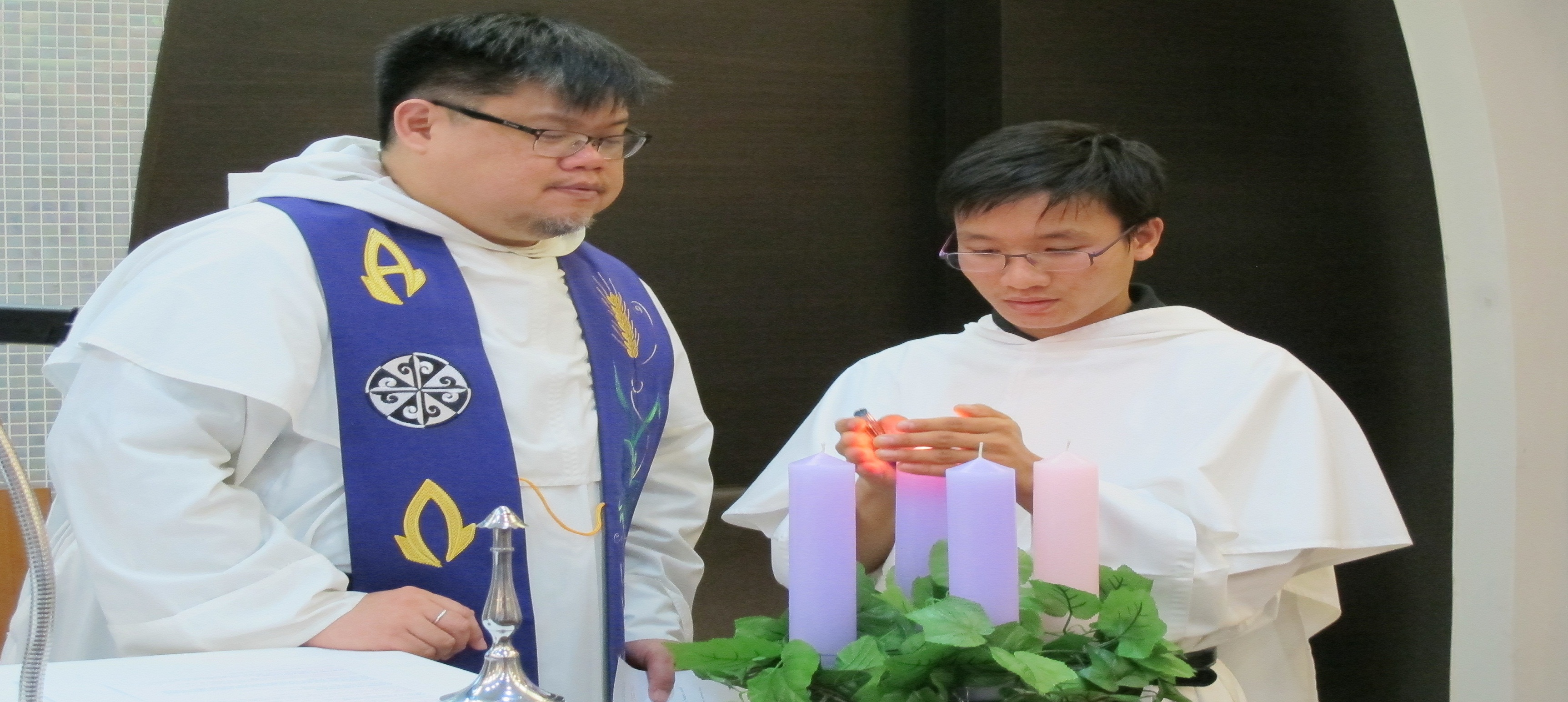
To some, today’s celebration of the First Sunday of Advent is a reminder that there is less than one month before the arrival of Christmas. To others, it means that the rush is on to put colorful lights and decorations around the house, to buy what is needed for the Christmas dinner, celebrations and parties, to shop for presents, start sending Xmas cards and Xmas messages. And to others, it means an extra time to make external peace with relatives so all may have a family Christmas dinner.
However the real meaning of Advent is far from all that. The season of Advent is a time for Christians, for each one of us to prepare ourselves for the coming of the Lord. As simple as that. The time of advent is not just related to something that will take place in the future. Advent is a time which involves the past the present and the future. And we are call to prepare ourselves to celebrate first something that happened in the past, that is to say, the birth of the Messiah into the world, which took place more than 2000 years ago. Secondly, to prepare ourselves for something that will happen in the future, the Second Coming of Christ at the end of time. And thirdly, to prepare and celebrate something that happens in the present, or what is the same, the many moments of grace which are occasions for the Lord to come into our lives as individual and in our midst as a community of the people consecrated of God.
How good are you at reading and interpreting everyday signs? I believe we all think to have some gifts to foresee what is going to happen. However, how good are we at interpreting signs, which God sends our way? The people of Jesus’ time expected that the coming of the Messiah would be accompanied by extraordinary signs and wonders. However Jesus’ first coming was in obscurity in a cave at Bethlehem. Jesus, during his public ministry performed numerous signs: turning water into wine, calming the storm at sea and walking on water, multiplying seven loaves of bread in the wilderness to feed 5000 people, healing the blind and the lame, expelling demons, and raising the dead. While many believed in Jesus because of the signs, many others questioned his signs and refused to believe his claim to be the Messiah.
Jesus is not encouraging us to spend time interpreting the signs around us concerning the end of time, or calculating the time when the end of the world will take place.  We are encouraged to experience the signs that Jesus is sending each and every single one of us everyday. We have to watch for the times when God extends His Love to us. We must watch for the times when we can serve Him by serving others. We need to watch for the opportunities to come closer to His Love through prayer and sacrifice. We have to watch and be alert for the opportunities Jesus is sending us to grow. Advent, the time of watching reminds us that our entire lives must be a watching for ways that we can grow more spiritual, grow closer to Christ and to the people we live with. Advent is a time for us to watch and read the signs taking place in other people, we have to prepare ourselves and be ready to meet him when he calls us. We have to be alert, watch and read the signs that Jesus is sending us to forgive those who have hurt us, to make peace with any member of our family so that we can have hot just a Christmas dinner but a Christmas celebration
This is Advent and to the extent that we do this well, to the extent that our lives are a celebration of the presence of Christ in ourselves, in our community and in the world, to that extent, our entire lives will be a real celebration of Christmas.
May Advent be a true moment of preparation for each and everyone of us in the expectation of the coming of Jesus at Christmas, in our everyday, at death, or at the last coming of the Lord, which ever may come first.

 May the Lord Jesus be with each and everyone of you as we strive to be alert to recognize his signs.
Fr. Alejandro Salcedo Garcia, O.P.











